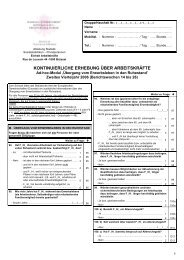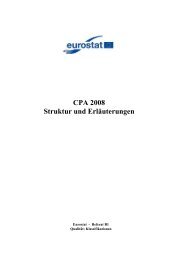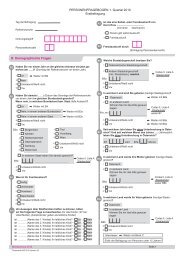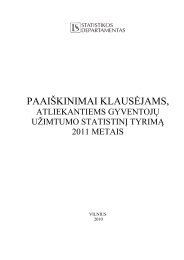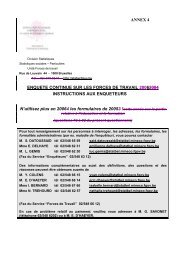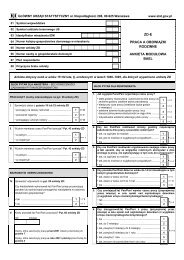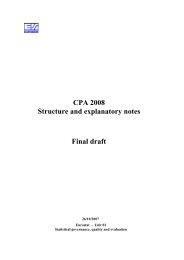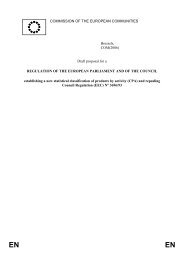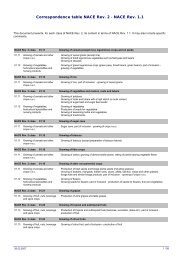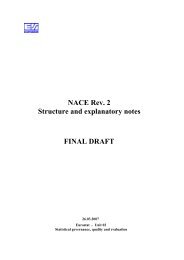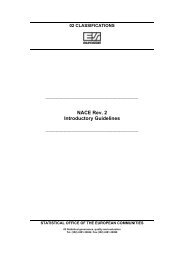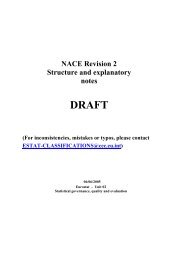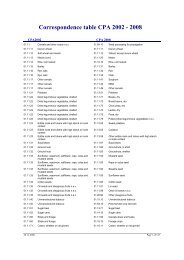Current state of publication of legislation in the EU ... - CIRCA - Europa
Current state of publication of legislation in the EU ... - CIRCA - Europa
Current state of publication of legislation in the EU ... - CIRCA - Europa
Create successful ePaper yourself
Turn your PDF publications into a flip-book with our unique Google optimized e-Paper software.
5. Workflow and exchange <strong>of</strong> <strong>in</strong>formation between <strong>the</strong><br />
executive/legislative authority and <strong>the</strong> <strong>of</strong>ficial gazette<br />
A seamless electronic workflow between <strong>the</strong> public adm<strong>in</strong>istrative or legislative<br />
authority and <strong>the</strong> government gazette publisher (or database producer) is <strong>in</strong>dicated by<br />
seven Member Sates, i.e. <strong>the</strong> m<strong>in</strong>ority. When tak<strong>in</strong>g <strong>in</strong>to account that probably <strong>in</strong> most<br />
<strong>of</strong> <strong>the</strong>se cases <strong>the</strong> seamless workflow does not really cover all <strong>legislation</strong> (i.e. at least<br />
95 %), this k<strong>in</strong>d <strong>of</strong> organis<strong>in</strong>g <strong>in</strong>put is still largely <strong>the</strong> exception <strong>in</strong> Europe.<br />
It seems that, <strong>in</strong> reality, <strong>the</strong>re are two ma<strong>in</strong> problems prevent<strong>in</strong>g true solutions for a<br />
country. In public adm<strong>in</strong>istration, numerous bodies generate draft <strong>legislation</strong> proposals<br />
and all <strong>the</strong>se bodies must be coord<strong>in</strong>ated. In addition to <strong>the</strong>se problems, <strong>the</strong>re is also<br />
<strong>the</strong> pressure <strong>of</strong> time, this be<strong>in</strong>g particularly acute <strong>in</strong> <strong>the</strong> parliamentary handl<strong>in</strong>g <strong>of</strong><br />
legislative proposals (policy-mak<strong>in</strong>g calls for amendments at very short notice), so <strong>the</strong><br />
obvious th<strong>in</strong>g to do is to bypass long and drawn-out formal procedures.<br />
The vast majority <strong>of</strong> European countries have drawn <strong>the</strong> relevant conclusions and, <strong>in</strong><br />
addition to <strong>the</strong> electronic medium, allow or tolerate a hard-copy <strong>in</strong>terface.<br />
Never<strong>the</strong>less, much headway can be expected <strong>in</strong> <strong>the</strong> near future <strong>in</strong> this area.<br />
6. The use <strong>of</strong> techniques based on XML/SGML<br />
Perhaps one <strong>of</strong> <strong>the</strong> most important technical developments, both generally and <strong>in</strong><br />
terms <strong>of</strong> legal <strong>in</strong>formation, is <strong>the</strong> Extensible Markup Language (XML), which allows<br />
<strong>the</strong> form and content <strong>of</strong> text and text components to be marked up. Just how important<br />
and necessary this development was for <strong>the</strong> legal sector can be gauged from <strong>the</strong> fact<br />
that, as long ago as <strong>the</strong> early 1970s, comprehensive ‘category schemes’ had been<br />
developed for legal-type documents and ‘predecessors’ <strong>of</strong> XML for legal texts<br />
developed (particularly <strong>in</strong> <strong>the</strong> early 1970s <strong>in</strong> Austria and <strong>in</strong> <strong>the</strong> mid-1980s <strong>in</strong> Norway).<br />
XML is used <strong>in</strong> 15 Member States (<strong>in</strong>clud<strong>in</strong>g <strong>the</strong> <strong>EU</strong> itself), but its use <strong>in</strong> many cases<br />
does not cover <strong>the</strong> whole field <strong>of</strong> legislative documents, and <strong>the</strong> potential <strong>of</strong> XML is<br />
by far unexploited. If <strong>the</strong> full potential <strong>of</strong> XML is to be used, def<strong>in</strong>itions <strong>of</strong> XML<br />
schemes are needed, and <strong>in</strong> Europe this is <strong>the</strong> exception (<strong>EU</strong>, Denmark, France,<br />
Austria and Slovenia) ra<strong>the</strong>r than <strong>the</strong> rule <strong>in</strong> <strong>the</strong> legal sector.<br />
One <strong>of</strong> <strong>the</strong> most important tasks at present is to develop XML schemes for legal<br />
document types that are as uniform as possible across Europe. The ball was recently<br />
set <strong>in</strong> motion (e.g. <strong>the</strong> ‘Work<strong>in</strong>g Group XML’ <strong>of</strong> <strong>the</strong> European Forum <strong>of</strong> Official<br />
Gazettes) and hopefully <strong>the</strong> efforts will result ‘at least’ <strong>in</strong> a uniform metalanguage.<br />
Werner Robert Svoboda<br />
<strong>Current</strong> <strong>state</strong> <strong>of</strong> <strong>publication</strong> <strong>of</strong> <strong>legislation</strong> <strong>in</strong> <strong>the</strong> <strong>EU</strong> Member States<br />
Page 6/17



